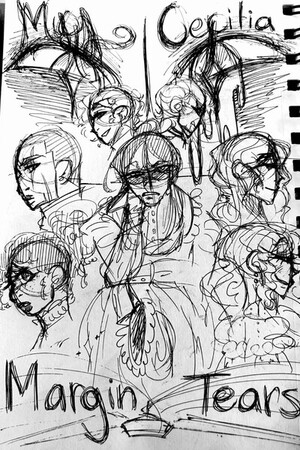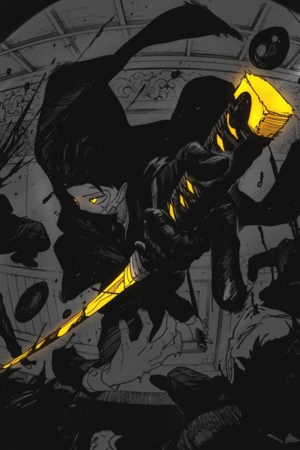Chapter 33:
YAuno oislteAlblWu CaymlBlopl
Margin Tears: My Cecilia
…
…
…
…
The ball, apparently, was still ongoing. The chandeliers still blazed with their eternal golden light. The violins still played a waltz that had repeated so often the musicians must surely have collapsed from exhaustion—but no, here they were, sawing away at their strings, tirelessly devoted to narrative necessity.
Cecilia, however, was not dancing. She stood at the edge of the floor with a certain smug satisfaction, her arms crossed, quite prepared to watch the evening whirl itself into oblivion without her involvement.
Which, of course, was unacceptable.
“Revision,” the narrator’s voice purred, and the entire ballroom blurred like wet ink. The laughter, the glances, the glass chandeliers—all reassembled themselves into something sharper, more pointed, more humiliating.
Cecilia blinked, and suddenly, a glass of champagne was upended over her head.
She gasped. “What—?”
“Oh, you poor thing!” cried a baroness with powdered hair. “Do forgive me. My hand slipped.”
Cecilia knew, of course, it had not. She could hear the narrator chuckling in her ear. So much more amusing this way, don’t you think?
Cecilia squeezed champagne from her hair and whispered under her breath, “This is juvenile.”
It’s a character-building moment, the narrator crooned.
And then—revision again.
This time, Cecilia tripped. Not on a hem, nor on her own feet—on absolutely nothing. She sprawled in the center of the floor, her dignity scattering as widely as the hors d’oeuvres she had been carrying. The crowd gasped as one. The strings stuttered a note in mock sympathy.
“Oh heavens, the maid has taken a fall!”
“Oh, how terribly clumsy of her—though what else might one expect?”
Cecilia sat up, her lip smarting from where she’d bitten it, and muttered, “Yes, yes, all very original. How many times do you intend to run me through the wringer?”
The narrator sighed. As many as it takes for you to stop trying to wriggle free. You were meant to be the humble servant who is elevated by scandalous romance, not some…insolent commentator.
Cecilia rose, brushing cake crumbs from her gown—and her gown, of course, split audibly down the seam. A neat line of fabric betrayal.
The assembly tittered.
“How indecent!”
“Positively disgraceful!”
“Shouldn’t she be grateful to wear such a dress at all?”
Cecilia, grimacing, held the fabric together with both hands. “All right,” she said, voice trembling between irritation and laughter, “we’ve established I’m clumsy, poor, and unfashionable. Shall we bring out the rotten tomatoes next, or does the narrative prefer its metaphors less literal?”
Do not tempt me, the narrator said darkly.
The violinists resumed, louder than before, drowning Cecilia’s muttered curses as the scene carried on without her consent. She limped back to the edge of the dance floor, wounded in spirit and shin alike, and understood the truth: she wasn’t allowed to slip out of this satire anymore. The story itself had her pinned.
The dance of humiliation had only begun.




Please sign in to leave a comment.